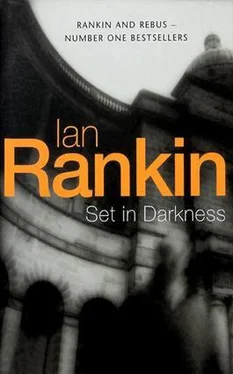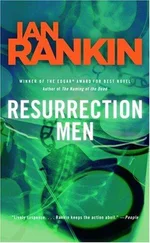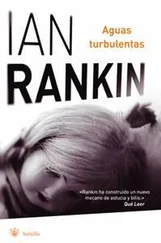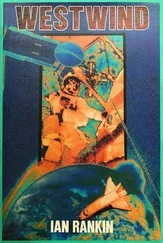He heard the church doors opening, the organ music swelling. Walked away from the graveside and took up position at a nearby grouping of poplars. Half an hour later it was all over. Howls and handkerchiefs, black ties and lost looks. As the mourners filtered away, their emotions went with them. What was left was industry, as the diggers got busy filling in the hole. Car doors, engines revving. The scene was cleared in minutes. The churchyard was just that again: no voices or cries, just a crow’s defiant call and the crisp working of shovels.
Rebus moved further away, towards the rear of the church building, but keeping the graveside in view. Trees and headstones camouflaging him. The headstones were worn almost smooth. He got the feeling very few these days were privileged to have their resting place here. There was a much larger purpose-built cemetery across the road. He picked out a few names — Warriston, Lockhart, Milroy — and read evidence of infant mortality. Hellish to lose a son or daughter. Now Alicia Grieve had lost two.
An hour he waited, feet growing icy as the damp penetrated his shoe soles. The sleet wasn’t letting up, the sky a hard grey shell, muffling the life beneath. He didn’t smoke; smoke might draw attention. Even kept his breathing slow and regular, each exhalation a billowing indication of life. Just a man coming to terms with mortality, graveyard memories of past family, past friends. Rebus had ghosts in his life: they came hesitantly these days, not sure how welcome they’d be. Came to him as he sat in darkness, incidental music playing. Came to him on the long nights when he had no company, a gathering of souls and gestures, movement without voice. Roddy Grieve might join them some day, but Rebus doubted it. He hadn’t known the man in life, and had little to share with his shade.
He’d spent all day Sunday in pursuit of Rab Hill. At the hotel, they admitted that Mr Hill had checked out the previous evening. A bit of pressing, and Rebus was informed that Mr Hill hadn’t been seen for a day or two beforehand. Then Mr Cafferty had explained that his friend had been called away. He’d settled the account, keeping his own room open, date of departure uncertain. Cafferty was the last person Rebus wanted to talk to about Hill. He’d been shown the bedroom — nothing had been left behind. As staff said, Mr Hill had brought only the one canvas duffel bag with him. Nobody’d seen him leave.
Rebus’s next stop had been Hill’s parole officer. It had taken him a couple of hours to track down her home phone number, and she’d been none too pleased to have her Sunday disturbed.
‘Surely it can wait till tomorrow.’
Rebus was beginning to doubt it. Eventually she’d given him what she could. Robert Hill had attended two interviews with her. He wasn’t due to see her again until the following Thursday.
‘I think you’ll find he misses that appointment,’ Rebus told her, putting down the receiver.
He’d spent his Sunday evening parked outside the hotel; no sign of either Cafferty or Hill. Monday and Tuesday he’d been back at St Leonard’s, while his future was debated by people so far up the ladder they were little more than names to him. In the end, he was kept on the case. Linford hadn’t been able to offer any real evidence to support his claim, but Rebus got the feeling it was more to do with PR. Gill Templer, the rumour went, had argued that the last thing the force needed was more bad publicity, and pulling a well-known officer from a high-profile inquiry would have the media vultures hovering.
Her approach had gone straight to the deepest fears of the High Hiedyins. Only Carswell, the story went, voted for Rebus’s suspension.
Rebus still had to thank her.
He looked up now and saw a cream trench coat moving across the grass towards the grave, hands deep in pockets, head bowed. Moving briskly, and with definite purpose. Rebus started moving, too, eyes never leaving the figure. A man, tall, thick hair slightly tousled, giving an impression of boyishness. He was standing graveside as Rebus approached. The diggers were still working, nearly done now. The headstone would come later. Rebus felt slightly dizzy, the way gamblers sometimes did when long odds romped home. Three feet behind the figure now... Rebus stopped, cleared his throat. The man’s head half-turned. His back straightened. He began to walk away, Rebus following.
‘I’d like you to come with me,’ he said quietly, his performance watched by the gravediggers. The man said nothing, kept moving.
Rebus repeated the request, this time adding: ‘There’s another grave you should see.’
The man slowed, but didn’t stop.
‘I’m a police officer, if that’s what you’re worried about. You can check my warrant card.’
The man had stopped on the path, only a yard or two inside the gate. Rebus moved around in front of him, seeing the full face for the first time. Sagging flesh, but suntanned. Eyes which spoke of experience and humour and — above all — fear. A cleft chin, showing flecks of grey stubble. Weary from travel, mistrustful of this stranger, this strange land.
‘I’m Detective Inspector Rebus,’ Rebus said, holding up the warrant card.
‘Whose grave?’ It was said almost in a whisper, no sign of native accent.
‘Freddy’s,’ Rebus said.
Freddy Hastings had been buried in a barren spot in a sprawling cemetery on the other side of the city. No marker had been erected, so that they stood by an anonymous soft hillock, the bare earth covered patchily with sections of turf.
‘There weren’t many turned out for this one,’ Rebus said. ‘Couple of fellow officers, old flame, couple of winos.’
‘I don’t understand. How did he die?’
‘He killed himself. Saw something in the paper, and decided, God knows why, that he’d had enough of hiding.’
‘The money...’
‘Oh, he spent some of it at first, but after that... Something made him leave it untouched, for the most part. Maybe he was waiting for you to show up. Maybe it was just the guilt.’
The man didn’t say anything. His eyes were glassy with tears. He reached into his pocket for a handkerchief and wiped at his face, shivering as he replaced it.
‘Bit parky this far north, eh?’ Rebus said. ‘Where have you been living?’
‘The Caribbean. I run a bar there.’
‘Bit of a ways from Edinburgh.’
He turned towards Rebus. ‘How did you find me?’
‘I didn’t have to: you found me . All the same, the paintings helped.’
‘Paintings?’
‘Your mother, Mr Grieve. She’s been putting you on canvas ever since you left.’
Alasdair Grieve wasn’t sure if he wanted to see his family.
‘At this time,’ he argued, ‘it might be too much.’
Rebus nodded. They were seated in an interview room at St Leonard’s. Siobhan Clarke was there, too.
‘Don’t suppose’, Rebus said, ‘you want your visit here trumpeted from the Castle ramparts?’
‘No,’ Grieve agreed.
‘Incidentally, what name do you go by these days?’
‘My passport says Anthony Keillor.’
Rebus wrote the name down. ‘I won’t ask where you got the passport.’
‘I wouldn’t tell you if you did.’
‘Couldn’t shrug off every link with the past, though, could you? Keillor, short for Rankeillor.’
Grieve stared. ‘You know my family.’
Rebus shrugged. ‘When did you find out about Roddy?’
‘A few days after it happened. I thought of coming back then, but didn’t know what good it would do. Then I saw the funeral announcement.’
‘I wouldn’t have thought it would make the Caribbean papers.’
‘The Internet, Inspector. The Scotsman online.’
Rebus nodded. ‘And you thought you’d take the chance?’
Читать дальше












